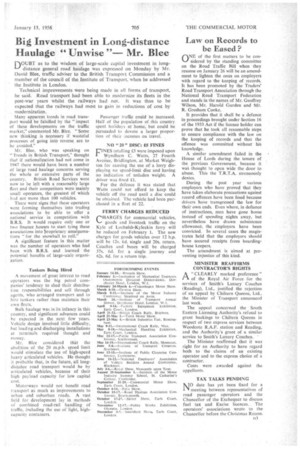Big Investment in Long-distance Haulage "Unwise "Mr. Blee
Page 49

If you've noticed an error in this article please click here to report it so we can fix it.
DOUBT as to the wisdom of large-scale capital investment in longdistance general road haulage was expressed on Monday by Mr. David Blee, traffic adviser to the British Transport Commission and a member of the council of the Institute of Transport, when he addressed the Institute in London.
Technical improvements were being made in all forms of transport, he said. Road transport had been able to modernize its fleets in the post-war years whilst the railways had not it was thus to be expected that the railways had most to gain in reductions of cost by . modernization.
Many apparent trends in road transport would be falsified by the "impact of these developments on the traffic market;" commented Mr. Bice. " Some new thinking is necessary if wasteful processes of going into reverse are to be avoided."
Mr. Blee, who was speaking on Trends in British Transport," thought that if nationalization had not come in 1947 there would have been a number of large road haulage concerns serving the whole or extensive parts of the country, British Road Services were now to be left with a reasonably large fleet and their competitors were mainly small operators, the greatest Of which had not more than 100 vehicles.
There were signs that these operators were forming themselves into trading associations to be able to offer a national service in competition with B.R.S. It would require only one or two finance houses to start tying these associations into 'broprietary amalgamations " for the snowball to roll."
A significant feature in this matter was the number of operators who had been with B.R.S. and learned the potential benefits of large-scale •organization. Passenger traffic could be increased. Half of the population of .this country spent holidays at 'borne, but could be persuaded to devote a larger proportion of their incomes on travel.
NO "20" DISC: LS FINES L"INES totalling £5 were imposed upon Wyndham C. Watts, 27 Fourth Avenue, Bridlington, at Market Weighton for causing the use of a lorry displaying no speed-limit disc and having no indication of unladen weight. A driver was fined £1.
For the defence it was stated that Watts could not afford to keep the vehicle off the road until a disc could be obtained. The vehicle had been purchased in a fleet of 22.
FERRY CHARGES REDUCER rHARGES for commercial vehicles, goods and livestock traffic on the Kyle of Lochalsh-Kyleakin ferry will be reduced on February 1. The new charges for goods vehicles over 12 h.p. will be 12s. 6d. single and 20s. return. Coaches and buses will be charged 37s. 6d. for a single journey and 62s. 6d. for a return trip.




























































































































